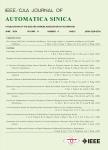Finite-Time Distributed Identification for Nonlinear Interconnected Systems
Finite-Time Distributed Identification for Nonlinear Interconnected Systems作者机构:Mechanical Engineering DepartmentMichigan State UniversityEast LansingMI 48824 USA KIOS Research and Innovation Center of Excellence and the Department of Electrical and Computer EngineeringUniversity of CyprusNicosia 1678Cyprus IEEE
出 版 物:《IEEE/CAA Journal of Automatica Sinica》 (自动化学报(英文版))
年 卷 期:2022年第9卷第7期
页 面:1188-1199页
核心收录:
学科分类:12[管理学] 1201[管理学-管理科学与工程(可授管理学、工学学位)] 081104[工学-模式识别与智能系统] 08[工学] 0835[工学-软件工程] 0811[工学-控制科学与工程] 0812[工学-计算机科学与技术(可授工学、理学学位)]
基 金:This work was partially supported by the European Union’s Horizon 2020 research and innovation programme(739551)(KIOS CoE) from the Republic of Cyprus through the Directorate General for European Programmes,Coordination and Development
主 题:Distributed concurrent learning finite-time identification nonlinear interconnected systems unknown dynamics
摘 要:In this paper,a novel finite-time distributed identification method is introduced for nonlinear interconnected systems.A distributed concurrent learning-based discontinuous gradient descent update law is presented to learn uncertain interconnected subsystems’*** concurrent learning approach continually minimizes the identification error for a batch of previously recorded data collected from each subsystem as well as its neighboring *** state information of neighboring interconnected subsystems is acquired through direct *** overall update laws for all subsystems form coupled continuous-time gradient flow dynamics for which finite-time Lyapunov stability analysis is *** a byproduct of this Lyapunov analysis,easy-to-check rank conditions on data stored in the distributed memories of subsystems are obtained,under which finite-time stability of the distributed identifier is *** rank conditions replace the restrictive persistence of excitation(PE)conditions which are hard and even impossible to achieve and verify for interconnected ***,simulation results verify the effectiveness of the presented distributed method in comparison with the other methods.



